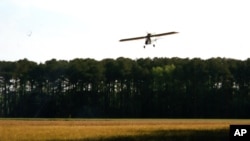Patricia Mawuli was nineteen years old and had just finished high school when she saw an airplane for the first time.
As she was collecting wood in a field outside of her uncle’s house in a rural area of Ghana, Mawuli heard loud noises that she said scared her at first.
“I saw these airplanes flying overhead, but because I was very close to the airfields, I thought the airplanes were chasing me,” she recalled years later.
But Mawuli said her fear did not last long. Before long, she started “to chase them -- to see what they were up to.”
She followed the airplanes to find out where they were landing. And once she arrived, she asked what she could do to work near the planes.
They told her she could clear wood from the area. She gladly accepted – but all along her sights were set higher.
“They didn’t have any plans for training girls,” she said. “Well I told them I could prove them wrong, because women can do things and even do it much better than men sometimes.”
Eventually, Jonathan Porter, an engineer and pilot at the airfield, trained and taught Mawuli to fly. Two years ago, on her 21st birthday, she became the country’s first licensed woman pilot – and that only marked the beginning of her journey.
Mawuli then helped found the AvTech Academy, short for the Aviation and Technology Academy Ghana, which trains young women how to fly, build and maintain light aircraft.
People forget,” she said “it’s only two percent of the world’s aircraft that are airliners,” she said. “The rest of the 98 percent are private planes and ultralights.” That means, Mawuli explained, there are real opportunities in the aviation industry for the young women taught at AvTech.
This is the academy’s second year, and there are three students. Four women are enrolled for next fall, added Mawuli. The school focuses on training young women from rural areas, who might not otherwise have the opportunity for advanced schooling. Mawuli puts most of her own salary from piloting and engineering back into the academy.
She said she wants to see young women pushed to achieve their potential. “I told myself, well if I have done this, there are many more women out there,” who might want to do the same. “And yet how many don’t have enough money to send them to continue their education.”
She said working at the academy has been a privilege. “In the world these days, not many girls go into engineering. And to be able to see these young and enthusiastic ladies, who are looking to learn more about engines, it’s a bit more encouraging – there’s hope for the future.”
As she was collecting wood in a field outside of her uncle’s house in a rural area of Ghana, Mawuli heard loud noises that she said scared her at first.
“I saw these airplanes flying overhead, but because I was very close to the airfields, I thought the airplanes were chasing me,” she recalled years later.
But Mawuli said her fear did not last long. Before long, she started “to chase them -- to see what they were up to.”
I told them I could prove them wrong, because women can do things, and even do it much better than men sometimes.”Patricia Mawuli, Ghanaian pilot
She followed the airplanes to find out where they were landing. And once she arrived, she asked what she could do to work near the planes.
They told her she could clear wood from the area. She gladly accepted – but all along her sights were set higher.
“They didn’t have any plans for training girls,” she said. “Well I told them I could prove them wrong, because women can do things and even do it much better than men sometimes.”
Eventually, Jonathan Porter, an engineer and pilot at the airfield, trained and taught Mawuli to fly. Two years ago, on her 21st birthday, she became the country’s first licensed woman pilot – and that only marked the beginning of her journey.
Mawuli then helped found the AvTech Academy, short for the Aviation and Technology Academy Ghana, which trains young women how to fly, build and maintain light aircraft.
People forget,” she said “it’s only two percent of the world’s aircraft that are airliners,” she said. “The rest of the 98 percent are private planes and ultralights.” That means, Mawuli explained, there are real opportunities in the aviation industry for the young women taught at AvTech.
This is the academy’s second year, and there are three students. Four women are enrolled for next fall, added Mawuli. The school focuses on training young women from rural areas, who might not otherwise have the opportunity for advanced schooling. Mawuli puts most of her own salary from piloting and engineering back into the academy.
She said she wants to see young women pushed to achieve their potential. “I told myself, well if I have done this, there are many more women out there,” who might want to do the same. “And yet how many don’t have enough money to send them to continue their education.”
She said working at the academy has been a privilege. “In the world these days, not many girls go into engineering. And to be able to see these young and enthusiastic ladies, who are looking to learn more about engines, it’s a bit more encouraging – there’s hope for the future.”





